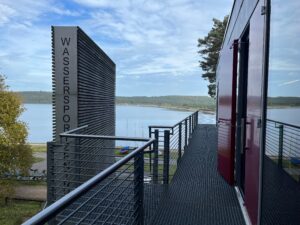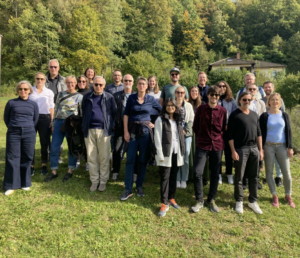Research & Study Program
Research Program
The interdisciplinary research training group analyzes contemporary literatures since 1945 in different public and cultural contexts. It is based on a broad concept of literature, including socio-cultural, political, and economic contexts, (inter-)mediality, institutional conditions, as well as literary life as objects of enquiry.
The RTG focuses on literatures in various languages (English, German, French, Spanish, Russian), including “small literatures” and minority cultures on different continents. Accordingly, it investigates the interactions between literatures and public spheres in a differentiated manner. Adopting a comparative and transnational perspective, it considers praxeological, social, media related, material, ethical, and economic aspects.
The RTG explores the cultural specificities, potentials, and functions of these literatures and investigates their conditions of emergence and public resonance. It conceives of literatures (1) as seismographs of often contradictory cultural, media related, and social developments, (2) as generators of a vocabulary to articulate the multilayered experiences of the contemporary moment, and (3) as forums for the discussion of concerns relevant to the public.
Drawing on five closely interrelated fields of interest, the RTG examines how fragmenting publics constitute a relevant context for and a prominent concern of these literatures:
- Literatures’ strategies to activate attention
- Public contexts of literatures
- Material appearances/materiality of literatures
- Literary knowledge production
- Literary ethics and politics
Study Program
The study program of the research training group is interconnected with the research program’s fields of interest I-V. The RTG follows a coordinated study program with consecutive teaching and learning components. They encompass mandatory elements, additional workshops and discussion formats, as well as optional in-depth study units and further facultative additions to the program.
Ruth-Klüger-Forum
The Ruth-Klüger-Forum (90 minutes biweekly + 3 additional workshop and discussion formats) constitutes the center of the research training group’s academic collaboration. It provides the opportunity for continuous and productive exchange between the participants, the collaborative development of scientific ideas, as well as short-term scheduling. The forum is the place for discussing current projects, methodological aspects, plans for workshops, conferences and conventions, and essential organizational questions. The dissertation projects are presented to and discussed with the entire forum, enabling the experience of cooperative development of research and refining projects through continuous dialogue.
Within the framework of the Ruth-Klüger-Forum, the RTG usually schedules two guest lectures every semester by experts in related academic fields and representatives from cultural institutions. Guest lectures are followed by workshops or discussion formats the next day.
The workshops serve as a means of exploring potential connections in subject matter and methodology between the guest lectures and the dissertation projects; the discussion formats, or “Werkstattgespräche,” serve to explore individual career paths beyond the academic realm. Each semester, PhD candidates will join at least one of the workshops and corresponding discussion that suits their projects.
Modules
Beyond the Ruth-Klüger-Forum, the RTG study program combines theoretical and practical study modules that alternate with the forum.
The Basic Module (1st semester, 90 minutes biweekly) provides a concise presentation of the ins and outs of academic work (time management, work schedules, academic writing, etc.) and negotiates the RTG’s core categories such as public sphere(s), the present, cultural difference(s), the literary work, the author/agent, the book market, and the literary system. It fosters reflective work and establishes measures of best academic practice.
The Methods Module (2nd semester, 90 minutes biweekly) covers various analytical procedures from Literary and Cultural Studies, Cultural Sociology, Media Studies, Book Studies, as well as the Public and Digital Humanities, based on the participants’ intended studies. The specific procedures, methods, and theories are always linked to the RTG’s framework, and the module provides space to discuss methodological questions concerning the individual research projects.
The Subject Module (3rd semester, biweekly) focuses on the specific interconnections between the RTG’s five fields of interest. The collective development of these fields of interest is linked to the respective dissertation projects. The module has the goal to contextualize the projects within the RTG’s larger thematic framework and further advance the RTG’s framework accordingly.
Inspired by the discussions and the work proposals within this module, the RTG plans one larger, international academic conference per funding phase to further collaborative research. Additionally, a smaller conference towards the end of the last year of funding will serve as a preliminary conclusion. Each doctoral candidate will contribute to the preparation and execution of one of the conferences and will participate in the collective publication of a research volume pertaining to the subject of the conference.
Research retreats outside of Erlangen take place at the end of the 2nd and 4th semester respectively. The doctoral candidates spend 3 days (6 hours each) with two Mercator-Fellows to thoroughly discuss their text drafts. The retreat serves to promote and support an early and continuous writing process.
The second half of the funding phase (4th-6th semester) designates time for an internship of variable length (6-12 weeks) with one of the external cooperation partners or relevant FAU departments (press department, supervision of the university’s collections, ZiWiS, etc.).
From the 2nd semester on, candidates are offered a selection of elective study options they can choose from.
The elective program includes the following options and institutions:
- Senior seminars, research seminars and colloquia, offered by the PIs, their institutes and departments
- FAU Graduate Centre (FAU GZ)
- FAU Language Centre (Sprachenzentrum)
- Computing Centre (RRZE) and University Library (UB)
- Training Centre for Higher Education (FBZHL)
- Teaching a class related to dissertation topic
- Classes from the degree program “Module Studies Digital Humanities”
- Participation in the annual Erlangen Poets’ Festival (Poet*innenfest)
- Collaboration in the task force Handbook concerned with the concept, development and editing of the central publication during the RTG’s first funding phase
Guest Lectures
2025
February, 4
“Containing Multitudes: The Social Logic of Lyric in the Mass Public Sphere”
Dr. Andrew Gorin, University of Haifa
00.5 PSG III, Kochstr. 6a, Erlangen
2024
December, 12
“Zum International Style des populären Realismus”
Prof. Dr. Moritz Baßler, University of Münster
B 302, Bismarckstr. 1, Erlangen
December, 10
“Opaque Practices and Literary Publics: New Writings from the Black Diaspora” (cancelled)
Prof. Dr. Kerstin Schmidt, LMU Munich
00.5 PSG III, Kochstr. 6a, Erlangen
November, 26
“The Nobel Prize and the Formation of World Literary Canon: From Eurocentrism to Inclusiveness”
Prof. Dr. Gisèle Sapiro, EHESS Paris
C 201, Bismarckstr. 1, Erlangen
November, 12
“Ausstellungen von Literatur anlässlich der Kafka-Ausstellung an der Bodleian Library, Oxford University”
Prof. Barry Murnane, Oxford University
00.5 PSG III, Kochstr. 6a, Erlangen
October, 29
“Schwarze Reportagen: Muckraking in Berlin und Wien um 1900”
Prof. Dr. Ethel Matala de Mazza, HU Berlin
Wassersaal, Orangerie, Erlangen
October, 29
“Martyrdom as Offence in Modern Jewish Literature”
Prof. Dr. Vivian Liska, Universiteit Antwerpen
C 201, Bismarckstr. 1, Erlangen
October, 28
“Literarischer Messianismus: Franz Kafka – Else Lasker-Schüler – Paul Celan”
Prof. Dr. Vivian Liska, Universiteit Antwerpen
B 301, Bismarckstr. 1, Erlangen
June, 25
“Why Helmut Read Hemingway: American Authors and the Post-War (Re-)Construction of a Broad German Reading Public”
PD Dr. Birte Christ, University of Gießen
A 602, Bismarckstr. 1, Erlangen
June, 11
“Was macht die Arbeit im Archiv? Möglichkeiten und Grenzen einer Institution”
Arnold Maxwill, Fritz-Hüser-Institut für Literatur und Kultur der Arbeitswelt, Dortmund
A 602, Bismarckstr. 1, Erlangen
April, 30
“Selektion in traditionellen und in Internet-Informationsintermediären. Eine wertebasierte Einordnung der Praktiken von Suchmaschinen und Bibliotheken”
Katharina Leyrer, FAU Erlangen-Nürnberg
January, 23
“Wie umgehen mit Rassismus im Werk Immanuel Kants?”
Maximilian Huschke, Universität Jena, DFG-Kossellek-Projekt “Wie umgehen mit Rassismus, Antisemitismus und Sexismus in Werken der klassischen Deutschen Philosophie?”
KH 1.016, Universitätsstraße 15, Erlangen
January, 17
“Schreiben und Lesen im Zeichen generativer Künstlicher Intelligenz”
Prof. Dr. Stephanie Catani, University of Würzburg
KH 1.020, Universitätsstraße 15, Erlangen
January, 16
“Theoretical Approaches to Digital Infrastructure: The Difficulties of Database Design and Identity”
Prof. Dr. Amy E. Earhart, Texas A&M University
via Zoom
January, 15
“Im Bann der Gegenwart. Zum Zusammenhang von Öffentlichkeit und Image”
Prof. Dr. Johannes Lehmann, University of Bonn
B 301, Bismarckstr. 1, Erlangen
2023
December, 13
“Wie wir die Welt sehen”
Ronja von Wurmb-Seidel, Journalist
via Zoom
November, 29
“Der Klima-Leviathan und die Erdgebundenen. Das politische Imaginäre des Klimawandels”
Prof. Dr. Eva Horn, University of Vienna
Kollegienhaus KH 1.020, Universitätsstraße 15, Erlangen
November, 21
“The Underground Railroad and the Aesthetics of Infrastructure”
Prof. Dr. Laura Bieger, University of Bochum
C 301, Bismarckstr. 1, Erlangen
November, 8
“KI als Autorin und Kuratorin in digitalen Öffentlichkeiten”
Prof. Dr. Jessica Heesen, University of Tübingen
Kollegienhaus KH 1.020, Universitätsstraße 15, Erlangen
November, 7
“Indigenous Futurities in Unexpected Places: Museums – Memory – (and Martians)”
Prof. Dr. Birgit Däwes, University of Flensburg
C 301, Bismarkcstr. 1, Erlangen
June, 13
“Social Capital: Epic Fantasy and the Magical School”
Prof. PhD Mark McGurl, Stanford University
KH 0.014, Universitätsstraße 15, Erlangen
2022
December, 19
“Flucht und Vertreibung in Literatur und Literaturwissenschaft”
Prof. Dr. Friederike Eigler, Georgetown University Washington
KH 0.014, Universitätsstraße 15, Erlangen
Workshops and Talks on Professional Practice
2024
December, 11-12
Academic Writing Workshop
Dzifa Vode
November, 12
Academic Career Workshop
Prof. Dr. Antje Kley, Prof. Dr. Dirk Niefanger
October, 30
Talk on Academic Prospects
Prof. Dr. Ethel Matala de Mazza, HU Berlin
June, 11
Workshop “Imparting Literature”
Arnold Maxwill, Fritz-Hüser-Institut für Literatur und Kultur der Arbeitswelt, Dortmund
April, 17
Poster and Poster Presentation Workshop
Birgit Lukowski
January, 23
Workshop on Constructions of Race and their Literary Function in Kleist’s “Die Verlobung in St. Domingo”
Luise Grabolle, Universität Leipzig, “Junges Forum Literaturwissenschaft”
2023
December, 13
Talk on Journalistic Practice
Ronja von Wurmb-Seibel
November, 30
Workshop “The Climate Leviathan and the Earthbound. The Political Imaginary of Climate Change”
Prof. Dr. Eva Horn, University of Vienna
July, 13
Workshop on Contractual Situations and Conditions
Stefan Rieger, ZGS-Projekt Schlüsselqualifikationen, FAU
May, 2-3
Workshop on Ghostwriting
Oliver Kobold
March, 27
Diversity Workshop
Prasad Reddy, Zentrum für Soziale Inklusion, Migration und Teilhabe/ZSIMT Bonn
Research Retreats
A second research retreat for the first cohort of PhD students took place from October 17-19 and was accompanied by three Mercator Fellows again (Martina Wagner-Egelhaaf, German Studies, University of Münster; Steffen Martus, German Studies, Humbolt University of Berlin; Johannes Völz, American Studies, Goethe University Frankfurt). Once more, the PhD candidates’ research projects were discussed in small groups with their advisors as well as the Mercator Fellows as external specialists. In the afternoons, the group went on hikes in the surroundings. The retreat opened with a presentation on “Autofiction” by Martina Wagner-Engelhaaf. It ended with a fireside chat with Steffen Martus on “Contemporary Literature as Social Practice.”

From October 5-7, a first reserach retreat for PhD students of the first cohort took place as a three-day compact event with three Mercator Fellows (Christine Magerski, Literature and Cultural Studies, University of Zagreb; Heinz Drügh, German Studies, Goethe University Frankfurt; Werner Sollors, English/American Studies, Harvard University). During the retreat, the PhD candidates’ research projects were discussed in small groups, including the candidates themselves, their advisors, as well as the Mercator Fellows as external specialists. In the afternoons, the group went on hikes in the surroundings. In the evenings, the Mercator Fellows presented their current projects.


